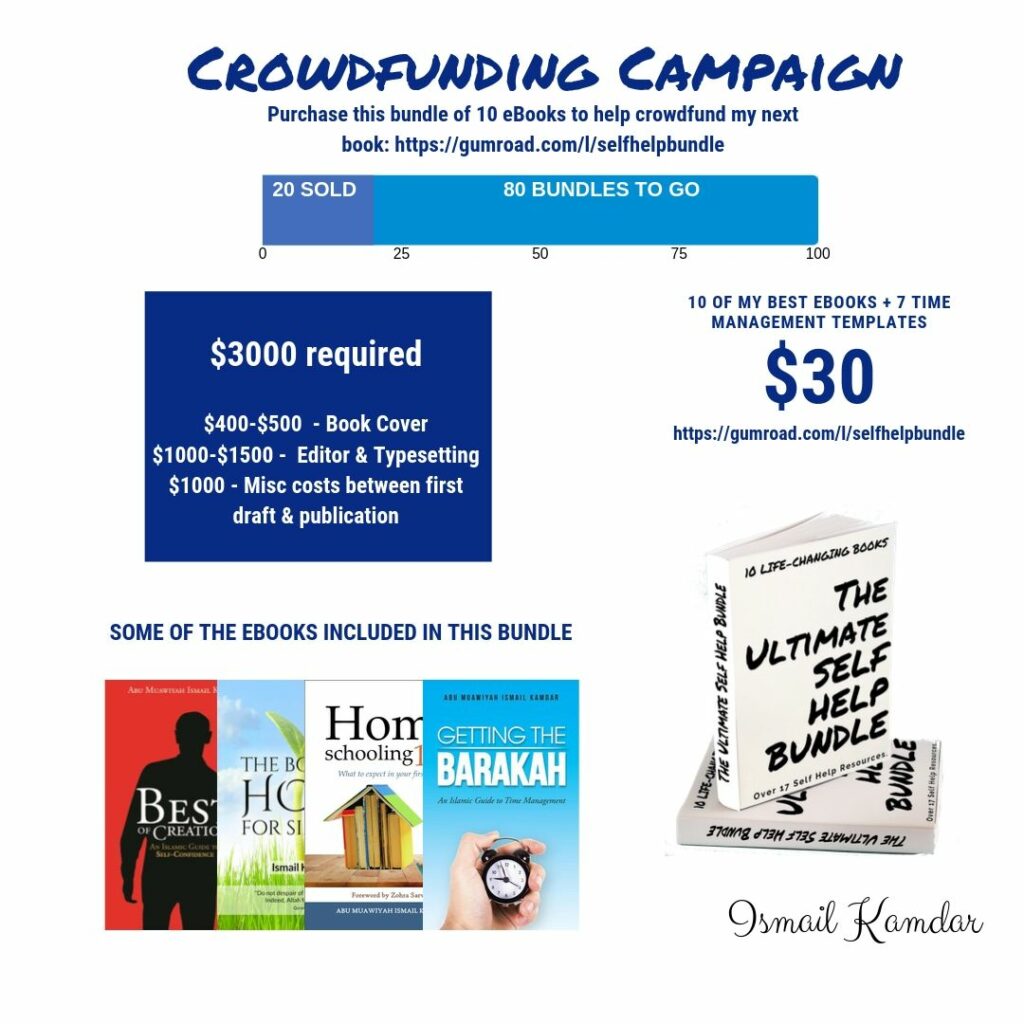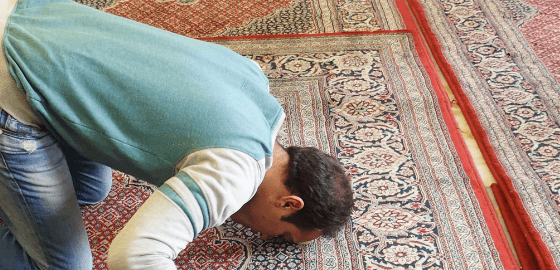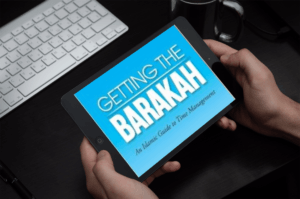While it is true that both modern and Islamic mentorship are effective in achieving worldly goals, it is important to note that this is not the primary focus of Islamic Mentorship. It is simply a byproduct of it. The focus of Islamic mentorship is on achieving righteousness, eternal salvation, and the life of Barakah.
Crowdfunding my new book
The Book
Alhamdulillah, I am three months away from launching my next book ‘Productivity Principles Of ʿUmar II’.
Below is the description of the book:
Imagine ruling a kingdom for only two and a half years, yet accomplishing so much that the world still benefits from your legacy a thousand years later.
That is the legacy of ʿUmar bin ʿAbd al-ʿAzīz, the 8th Umayyad King, and one of the greatest rulers in the history of the Muslim World. In this revolutionary new book, author Ismail Kamdar explores the principles that made ʿUmar II such a productive and influential ruler.
Take a trip through the first century of Muslim History, to explore the fifteen productivity principles that made ʿUmar II one of the greatest kings in the history of this world. In this book, author Ismail Kamdar discusses the biography of ʿUmar bin ʿAbd al-ʿAzīz focusing on the principles that made him an effective and productive leader.
The Obstacle
Unfortunately, I have run into a major hurdle along the way, and to be fully transparent, I am sharing it with you here.
In order to complete the production of the book (cover design, editing, typesetting), I need $3000.
The Win/Win Plan
I only need to sell 100 of these to cover the cost of production, and I am confident that this method is the best way to meet production costs while providing my readers with value for their money.
I came up with a Win/Win plan. To raise the money to cover the production of the book, I am selling a new eBook bundle: all 10 of my best eBooks + 7 time management templates for only $30. (or more, you can pay more for the bundle if you want to contribute more to the production of my next book)
The Pitch
So here is my pitch. If you enjoy reading my books and want to help see my next book hit the shelves, please purchase the eBook bundle here: https://gumroad.com/l/selfhelpbundle
I trust my readers, as, without your support, I wouldn’t be able to write any books. I hope that you all find this bundle worth your money, and will enjoy and benefit from my next book once it hits the market.
The Alternative
Some readers have been asking how they can contribute to my book production cost without purchasing an ebook.
I don’t ask for direct contributions but if you want to do so, you can send it to my PayPal here: paypal.me/IslamicSelfHelp.
Thank you all for all your support
A Thematic Tafsīr of Surah Yūsuf
Surah Yūsuf is one of the most beautiful and oft-studied Surahs of the Quran. In this short article, I hope to discuss the Surah from a different angle; Thematic Tafsīr.
Thematic Tafsīr is a modern method of Tafsīr in which the author/teacher analyzes a Surah for repeated themes and lessons. It is done by studying the Surah as a whole and cross-analyzing the various verses of the Surah for common themes. In applying this method to Surah Yūsuf, we can deduce four core themes that run throughout this Surah. Before we discuss these four themes, here is a brief summary of the Surah.
A Summary of Surah Yūsuf
Surah Yūsuf is unique in that the entire Surah tells a single story from beginning to end. This is not the usual method of storytelling in the Quran. The reason for this is that the entire story forms a single narrative full of important lessons, the beginning, and the end of the stories are equally needed to derive these lessons.
The Surah narrates the story of Prophet Yūsuf (Joseph). As a child, he has a dream of the sun, moon and eleven stars bowing to him. His brothers grow jealous of him and plot against him. They throw him in a well to get rid of him. He is taken away as a slave and ends up in the home of a minister in Egypt.
There he grows up. As a young man, he faces new trials. The minister’s wife tries to seduce him, but he resists and for this, he is wrongly imprisoned. He spends the next few years in prison, where he meets other prisoners and interprets their dreams. One of these prisoners is eventually released and ends up serving the king of Egypt.
At this point, the king has a dream and the ex-prisoner asks Yūsuf (s) to interpret it. Impressed by Yūsuf ‘s interpretation and piety, the king releases him from prison and makes him a finance minister. A drought causes Yūsuf’s brothers to seek financial assistance from the minister of Egypt which brings them into the court of Yūsuf. There, he confronts them, reveals his true identity, and ultimately forgives them.
Prophet Yūsuf’s family migrates to Egypt accepting Yūsuf as their leader. Thus his dream comes true, and the story ends. In this story, which is told in a lot more details in the Quran, are thousands of lessons. Most of these lessons revolve around one of four core themes.
Good triumphs in the end
The first theme we derive from this Surah is the importance of having hope in a good ending. As long as we are on the straight path, sincerely striving to please Allah, victory will come eventually. For some, it will be in this world, and for others, it will be in the next world, but it will eventually come.
This lesson inspires us with hope, no matter how bleak our situation may be. The Surah was revealed during the Makkan Era when the Prophet (s) did not yet control any lands or have a huge following yet. In many ways, it serves as a prophecy that Prophet Muhammad (s) was eventually going to triumph over the Arabs and attain power in those lands. It came through over a decade later.
The lesson for us all is straightforward; work hard for the sake of Allah and never lose hope. Victory will eventually come to the righteous.
Trials in the lives of the righteous
Saʿd b. Abī Waqqāṣ reported that he said, “O Messenger of Allah, which people are tested most severely?” The Messenger of Allah (s) said, “They are the prophets, then the next best, then the next best. A man is tried according to his religion. If he is firm in his religion, his trials will be more severe. If he is weak in his religion, he is tried according to his strength in religion. The servant will continue to be tried until he is left walking upon the earth without any sin.” (Sunan al-Tirmidhī 2398, Grade: Ṣaḥīḥ)
This narration summarizes the second theme of Surah Yūsuf; the righteous face the most difficult trials in life. Islam teaches us that life is a test. Every single human being is tested to determine their placement in the Afterlife. The intensity of the test depends on the spiritual state of the individual. The stronger a person is in faith, the more difficult their trials will be.
This is why the prophets had the toughest tests, due to their closeness to God. Prophet Yūsuf (s) faced both the trials of hardship (abandonment, slavery, imprisonment) and the trial of temptation (seduction). This teaches us the two manners in which we are constantly tested in life. Each phase of life is a trial through hardship, a trial through temptation, or a mixture of both. We must prepare for both types of trials if we want to earn a high rank in the Afterlife.
True Dreams
The third theme that runs throughout this Surah is the theme of true dreams. In this story, Yūsuf, two prisoners and a king all have dreams that come true. This is evidence that true dreams predicting the future are real and should be taken seriously.
Abū Saʿīd al-Khudrī reported that the Prophet (s) said, “When one of you sees a dream he likes, it is from Allah so let him praise Allah for it and speak about it. When one of you sees something else he dislikes, it is from Satan so let him seek refuge from its evil and not mention it to anyone. It will not harm him.” (Ṣaḥīḥ al-Bukhārī 6584)
Abū Hurairah reported that the Messenger of Allah (s) said, “When the end of time approaches, the dream of a believer can hardly be false. The dream of a believer is one of forty-six parts of prophecy and whatever is from prophecy cannot be false.” (Ṣaḥīḥ al-Bukhārī 6614, Ṣaḥīḥ Muslim 2263)
The above narrations confirm that true dreams will continue until the end of time. In fact, they will increase in frequency towards the end of time. True dreams are a gift from God showing people a glimpse of the future, as glad tidings if the future is good, or as a warning, if the future is an upcoming calamity. The ability to interpret dreams is innate and gifted to a few by God. It cannot be taught formally and relies on intuition and deep piety.
The Danger of the Nafs
The final theme of Surah Yūsuf is the importance of spiritual development. Every human possesses a Nafs (soul/desires) which can incline towards sin. The Nafs goes through various phases, the lowest of which is mentioned in this Surah, al-nafs al-ammāra bi-l-sūʾ (The soul that is inclined towards sin).
Our goal in life is to be aware of the temptations of the soul. We see two examples in this Surah of people who gave in to these temptations; the brothers of Yūsuf who threw him in a well out of jealousy, and the wife of the minister who tried to seduce him. These two examples show two different ways in which the soul can be corrupted; jealousy and lust. We must protect ourselves against both of these sources of corruption.
Purification of the soul is an essential part of Islam. Some Muslim groups ignore this aspect of Islam, due to their obsession with other parts of Islam like theology, legal rulings or political revival. By doing so, they allow corruption to slowly sneak into their souls and ruin it. Purification of the soul is something that no true believer can afford to neglect.
This ends my brief thematic Tafsīr of Surah Yūsuf. To learn more thematic Tafsīr, purchase my book ‘Themes of the Quran’ from one of the links below:
1. PDF Edition
2. Kindle Edition
3. Paperback Edition
How I read 50 books in 9 months
Over the past few years, I have made it my goal to read more books each year than the year before. By increasing the number of quality books I read per year, I increase the amount of knowledge I gain every year. Reading daily is a habit that I encourage everybody to take up. It isn’t just something I preach, it is something I am committed to doing myself.
Having in previous years, read 20-40 books a year, I decided to up my goal this year to 50 books. Alhamdulillah, I am happy to announce that nine months into the year, I have already completed 51 books, and am on my way to completing 7 more.
Now, in reality, this number isn’t really that impressive. Some of my teachers read 100 or more books per year. But these teachers are also retired and have more time on their hands. I have to handle a university job, a freelance career, a writing career, and homeschooling my kids. So I am quite happy with my progress in building this habit.
So the question I have been getting a lot in the past few days is, “How did you manage to read so many books this year?” The answer is rather lengthy so I decided to write this post about. There are six important steps that helped me accomplish this goal.
1. Having an ever-increasing to-read list.
To ensure that I never reach a point in the year where I don’t know what to read next, I am constantly adding books to my to-read list. I utilize Goodreads to keep track of every book I read, am currently reading, and plan to read in the future.
I also use it to keep track of my progress towards my annual reading goals. Whenever I come across a book I might be interested in, I add it to my Goodreads to-read list. That way, I always know what I plan to read next once I am done reading my current set of books.
Recommendation: Get a Goodreads Profile, and start using it to track your progress.
2. Reading more than one book at a time.
I don’t stick to one book at a time. This can sometimes be very tedious, especially if reading for multiple hours a day, and if the book is lengthy. Instead, I focus on two or three books at a time. That way, as soon as my attention is waning from one book, I can switch to another to keep my mind fresh. By reading multiple books at a time, I am able to finish 5-7 books per month easily.
Recommendation: Build a habit of reading two books at a time. This will be even more effective is they are from completely different genres.
3. Reading for two to three hours a day.
I started my habit many years ago with a dedicated half an hour a day for reading. As the years have gone by, I have increased it by half an hour each year. Currently, I read for two or three hours a day, depending on my workload. In this way, I am able to read more books per month by reading for more hours per day.
Recommendation: If you don’t have a habit of reading yet, start with building the habit of reading for thirty minutes every day. Once you are accustomed to it, slowly increase the amount of time you spent reading daily.
4. Alternating between long and short books.
One obstacle that prevents many people from meeting their reading goals is getting stuck in a long book until you lose interest. My way around this is to read multiple books at a time, some short and some long. That way, even if it takes me three months to read a long book, I would have completed 10 other books during that same time using this method.
For example, Principles by Ray Dalio is a very lengthy book on investing and finance, I started reading it in February, and completed it in May. At the same time though, I alternated between reading this for an hour and reading a shorter book for an hour. As a result, I read 12 other books during this same time period.
Recommendation: Don’t get stuck on lengthy books. Read a shorter book alongside it, so that you can meet your goals and not lose motivation.
5. Speed-Reading only when needed.
There are two situations in which I choose to speed-read; when I am reading about a topic I am already very familiar with, and when I am re-reading an old book that I read many years ago. Many books discuss similar topics, to master a topic I tend to read at least 10 books on the topic. I will read the first one or two slowly, but then start speed-reading through sections of the others. In this way, I cover more ground faster without wasting time slowly reading something I already read before.
Sometimes I re-read books I have read many years ago to refresh my memory or get a new perspective on them. Our thoughts, knowledge, and experience develop with time, so it is often helpful to go back and re-read old books with a new perspective to understanding them better.
Recommendation: If you find the content of a book familiar, try speed-reading it. If you know of any books that you read many years ago and didn’t understand, try re-reading them again this year. You will be surprised how much better you understand them now.
6. Incorporating reading into my work tasks.
I primarily earn a living through three things; university teaching and management, freelance writing, and writing my own books. All three require extensive reading and research. As a result, I have the privilege of being able to read on the job and to get paid for it.
Often a client will give me a list of books to read before writing their book/article for them. In these cases, they are literally paying me to read books. Likewise, the university expects me to have the latest information in my field, so reading books on the subjects I teach during work hours is an expected part of the job.
And of course, for my own books, I need to research thoroughly before writing, so I large part of my writing process is extensive reading.
Recommendation: If you really want to spend a large portion of your day reading, choose a job/career which requires you to read and research a lot.
Conclusion
Utilizing these six steps I am able to read dozens of books per year. I accomplish this by having a constantly growing to-read list, reading multiple books at a time, and dedicating hours of my day to reading. I also alternate between big and small books, speed-read when necessary, and do work that requires extensive reading. This is how I met this goal.
I hope this sufficiently answered the question. 🙂
Best books I’ve read this year
4 Causes of Barakah in Work
Barakah; abundance, blessings, the unexplainable increase in something, usually considered a type of Karāmat (miracle) gifted by Allah to pious Muslims.
Barakah is something that all Muslims seek. The unexplainable and blessed increase in time, wealth, progeny, and impact is one of the greatest blessings that Allah can grant to His servants.
But how do we gain these beautiful blessings, and is there a way to constantly experience Barakah in our work/careers/wealth?
There are many narrations that indicate the sources of Barakah in work. Here are four of the most important ones.
1. Work for the sake of Allah
Any mundane act can be transformed into an act of worship by purifying our intention. This includes our daily work. When Halal work is done for the sake of pleasing and obeying Allah, it becomes a source of reward and Barakah. This is regardless of whether the work is in itself Islamic or not. A woodcutter, a plumber, an accountant, and a doctor all equally qualify for Barakah when working for the sake of pleasing Allah and earning a Halal livelihood.
Anas ibn Mālik reported:
A man from the Ansar came to the Prophet, peace, and blessings be upon him, and begged from him. The Prophet said, “Have you nothing in your house?”
The man said, “Yes, a piece of cloth, a part of which we wear and a part of which we spread on the ground, and a wooden bowl from which we drink water.”
The Prophet said, “Bring them to me.” The man brought these articles to him and the Prophet took them in his hands and he said, “Who will buy these?” Someone said, “I will buy them for one coin.”
The Prophet said twice or thrice, “Who will offer more than one coin?” Someone said, “I will buy them for two coins.” He sold them for two coins and the Prophet said, “Buy food with one of them and give it to your family. Buy an ax and bring it to me.”
The man brought it to him. The Prophet fixed a handle on it with his own hands and he said, “Go gather firewood and sell it, and do not let me see you for a fortnight.” The man went away and gathered firewood and sold it. When he had earned ten coins, he came and bought a garment and food.
The Prophet said, “This is better for you than for begging to come as a blemish on your face on the Day of Resurrection. Begging is only appropriate for three people: one in grinding poverty, one in serious debt, and one who must pay a difficult compensation.”
(Sunan Abī Dāwūd 1641)
2. Give a portion of your earnings in charity
Charity increases wealth and causes Barakah. Of course, this is only when it is done for the sake of Allah. If you wish to experience Barakah in your daily life, then try to do an act of charity every day. It does not have to monetary, any action you do that helps another creature is an act of charity.
Abū Buraydah reported:
The Messenger of Allah, peace, and blessings be upon him, said, “Inside the human being are three hundred and sixty joints, upon each of them charity is due.”
They said, “Who can do that, O Prophet of Allah?”
The Prophet said, “It is spittle in the mosque you clean, or something in the road you move to the side. If you cannot find anything, it is enough to perform two cycles of forenoon prayer.”
(Sunan Abī Dāwūd 5242)
Asmāʾ reported:
The Messenger of Allah, peace, and blessings be upon him, said, “Spend in charity and do not count it, lest Allah counts it against you. Do not hoard it, lest Allah withholds from you.”
(Ṣaḥīḥ al-Bukhārī 2451, Ṣaḥīḥ Muslim 1029)
3. Work hard, but remain content and grateful
Muslims should work hard, while acknowledges that their sustenance is already decreed by Allah. Whether we work hard or not, Allah will send us what is written for us. The difference is that when we work hard for the sake of Allah, and accompany this with contentment in our destiny, and gratitude for our sustenance, then we experience Barakah in our earnings. Hard work followed by gratitude and contentment on a daily basis leads to Barakah.
“And [remember] when your Lord proclaimed, ‘If you are grateful, I will surely increase you.”
(Quran 14:7)
The Prophet, peace, and blessings upon him, said, “The best wealth is a tongue that remembers Allah, a grateful heart, and a believing wife to help him in his faith.”
(Sunan al-Tirmidhī 3094)
Abū Dhar reported:
The Messenger of Allah, peace, and blessings be upon him, said, “O Abū Dhar, do you say an abundance of possessions is wealth?” I said yes.
The Prophet said, “Do you say a lack of possessions is poverty?” I said yes.
The Prophet repeated this three times, then he said, “Wealth is in the heart and poverty is in the heart. Whoever is wealthy in his heart will not be harmed no matter what happens in the world. Whoever is impoverished in his heart will not be satisfied no matter how much he has in the world. Verily, he will only be harmed by the greed of his own soul.”
(al-Mu’jam al-Kabīr 1618)
4. Do work that benefits the ummah
In general, almost every Halal source of income is beneficial to others. This is the nature of Halal business because for a transaction to be Halal, it needs to be mutually beneficial. Every Halal transaction is an exchange of money for a beneficial product or service. However, some careers are more beneficial than others. Seek out sources of income that have the most impact on the ummah (community). The more beneficial your career is to others, the more Barakah you will experience in your life.
Ibn ʿUmar reported:
The Prophet, peace, and blessings upon him, said, “The most beloved people to Allah are those who are most beneficial to people. The most beloved deed to Allah is to make a Muslim happy, or to remove one of his troubles, or to forgive his debt, or to feed his hunger. ”
(al-Muʿjam al-Awsaṭ 6192)
Summary
If we work for the sake of Allah, our work becomes an act of worship and a source of Barakah for us. This is even more so if the work in beneficial to the ummah. We can increase this Barakah by practicing gratitude, contentment, and charity. These good deeds can turn any Halal source of income into a source of Barakah.
To learn more about Barakah, read my book Getting The Barakah, available here.








